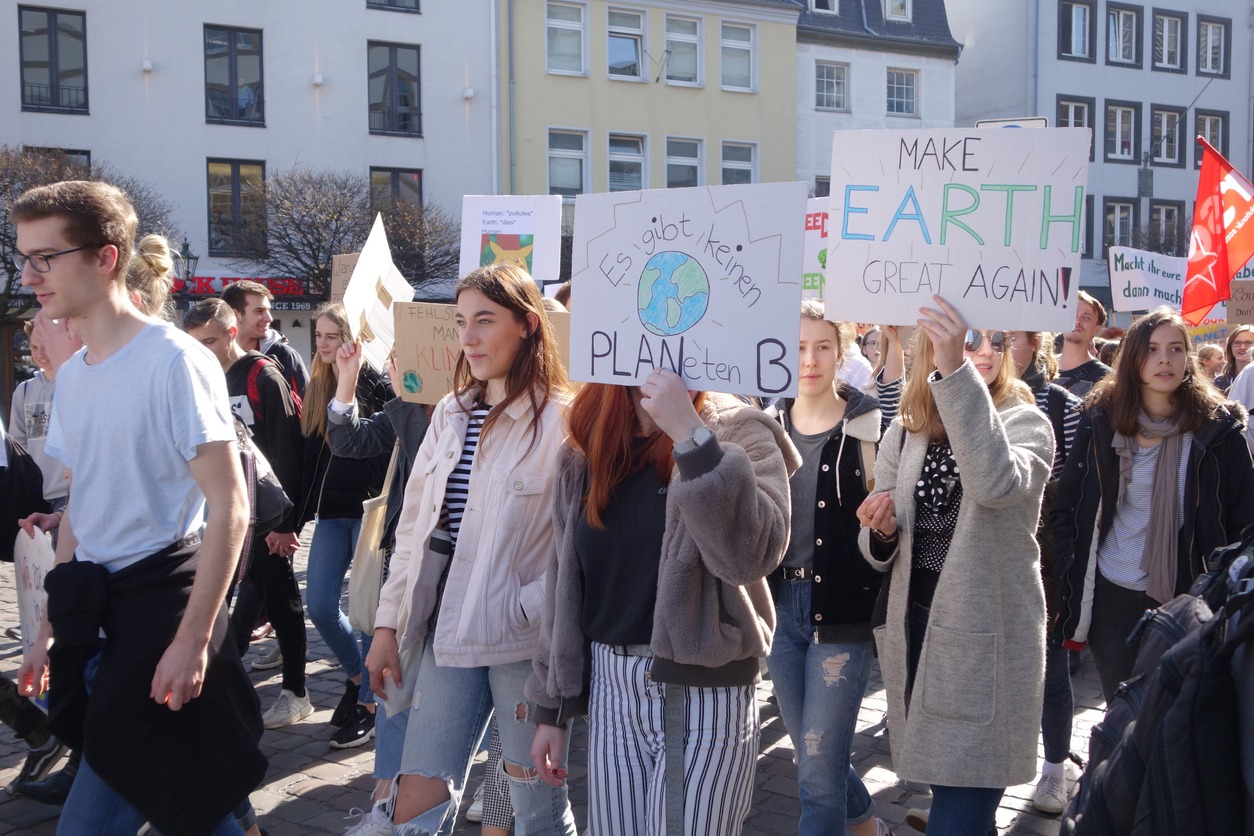Announcements are coming thick and fast out of Climate Week NYC as a range of organizations take advantage of the spotlight to push forward their environmental agendas. This NYC-based author has invitations to several climate week-related events this week as well as a speaking slot at NYC AgTech Week on Thursday so follow me on Twitter to get updates, but here’s a snapshot of bigger news items coming from the week related to agrifood. We will keep updating this article as the week goes on so stay tuned.
10:30 am, Sep 24: World Bank, Tesco, Sodexo, pledge efforts to combat food loss and waste at the Champions 12.3 event
Over at the Apella Restaurant on 29th St in New York City, big wigs from the World Bank and major retailers grabbed a mic and announced landmark developments toward halving food loss and waste by 2030, keeping in line with the UN’s Sustainable Development Goal (SDG) Target 12.3. It aims to “halve per capita global food waste at the retail and consumer levels and reduce food losses along production and supply chains, including post-harvest losses.”
“Every year the world is wasting 1.3 billion tons of food. That’s simply unacceptable,” said Dave Lewis, Chair of Champions 12.3 and Group Chief Executive of Tesco, Kicking off the event. “Food that’s produced but never eaten costs the global economy $940 billion annually and emits 8% of the greenhouse gases driving climate change.”
Snapshot: Stats on food loss and waste
Source: FAO, IFAD, UNICEF, WFP, WHO, WRAP |
The biggest takeaways? First up, the World Bank’s committed over $1 bn in sustainable development bonds to combat food loss and waste at the Champions 12.3 event . Since kicking off its first transaction in March 2019, the pledge is part of a campaign to raise awareness for the importance of combating food loss and waste.
World Bank bonds support the financing of sustainable development projects and programs in member countries. This includes the support to middle-income countries to address food loss and waste from farm to fork, with investments in infrastructure, access to markets and logistics, as well as waste management.
Champions 12.3 is committed to accelerating progress toward achieving the UN’s sustainable development target of halving per capita global food waste at the retail and consumer levels, and through production and supply chains by 2030. The coalition finds that more than two-thirds of the world’s 50 largest food companies have set targets in line with Target 12.3, in its latest report.
It also noted that more than 40% of them are measuring their food loss and waste, with one-third are pursuing actions at scale to reduce waste in their own operations. At the event, major players in the space, Tesco and Sodexo, did not disappoint with their announcements to revamp big global supply chains.
Tesco called for the reporting of food waste by retailers and hospitality businesses to be made mandatory. Company CEO Lewis, said “a lot of food companies have pledged to tackle food waste, but without transparency will not be able to judge if they are delivering on their commitment,” he said, adding that “the UK government has indicated it will introduce mandatory reporting and we call on them to do this urgently.”
Meanwhile, Sodexo has renewed its €1.3 billion revolving credit facility, which is the main driver behind its goal to prevent 50% of the food waste and food losses from its operations by 2025. At the event, company CEO Denis Machuel sent a clear signal to all his company’s stakeholders that Sodexo is accountable at all levels, including in its financing, for preventing food waste “from farm to fork”.
At Champions 12.3, the Sustainable Rice Platform, a global multi-stakeholder alliance, including Olam, Mars Food, Loc Troi, Ebro Foods, also called upon its members and the wider industry to commit to halving post-harvest rice loss and waste by 2030.
Read more on AFN here.
Sep 23: Danone CEO launches “One Planet Business for Biodiversity” coalition with 19 companies worth $500bn+ in annual revenues
On Monday, Emmanuel Faber, CEO of Danone, announced “One Planet Business for Biodiversity” (OP2B) at UN Climate Action Summit in New York alongside 19 companies and the World Business Council for Sustainable Development (WBCSD). They include Balbo Group, Barry Callebaut, DSM, Firmenich, Google, Jacobs Douwe Egberts, Kellogg Company, Kering, Livelihoods Funds, L’Oreal, Loblaw Companies Limited, Mars, Migros Ticaret, McCain Foods, Nestlé, Symrise, Unilever and Yara. OP2B is a new initiative to protect and restore biodiversity within their supply chains and product portfolios.
“After decades of investment by governments and industry, focused on efficiency and productivity to meet the needs of a growing world population, our globalized and highly specialized agricultural system is impacting loss of diversity on farms, loss of ingredient diversity in diets, and degradation of ecosystems. A recent report by the FAO (Food and Agriculture Organization of the United Nations) found that of the 6,000 plant species cultivated for food, just nine account for 66 percent of total crop production,” reads the announcement.
The coalition has pledged to develop innovative solutions aimed at protecting and enhancing biodiversity in agricultural systems in the following three ways:
- Scaling up regenerative agriculture practices to protect soil health.
Scaling up alternative farming practices that will leverage the power of plants to keep carbon in the soil (carbon sequestration), increase the capacity of soils to hold water, enhance the resilience of their crops, support the livelihoods of their farmers, and regain the nutrient density of food while decreasing reliance on synthetic inputs. This is what OP2B calls “regenerative agriculture”. (Danone already formed a coalition for regenerative dairy alongside several ag majors and our own portfolio company Connecterra – read more here.) - Developing product portfolios to boost cultivated biodiversity and increase the resilience of the food and agriculture models.
Increasing the number of ingredients sourced so we are less reliant on just a handful of crops, further developing provenance-based and local sourcing, and expanding the genetic variety of crops grown to regain food diversity and localized biodiversity specificity in agriculture as a powerful lever to protect and nurture biodiversity. - Eliminating deforestation, enhancing the management, restoration and protection of high-value natural ecosystems.
Defining specific actions within the value chains of OP2B members that can protect and restore the world’s most biodiversity-rich and fragile ecosystems, including grasslands, wetlands and forests.
The coalition has also pledged to report transparently on their progress and impact. Read more about the deal here.
23 Sep: Gates Foundation, World Bank, European Commission, Netherlands, Sweden, Switzerland, UK, Germany commit over $790m to help 300m smallholder farmers adapt to climate change
“Climate change, which is bringing more droughts, flooding and extreme weather events, is already taking a severe toll on farmers, especially in developing countries. Climate change may depress growth in global agriculture yields up to 30 percent by 2050. Meanwhile in poorer communities, where many people spend more than half of their incomes on food, food prices could rise by 20 percent or more. These impacts would push people further into poverty and be a major setback in achieving the Sustainable Development Goals,” reads the announcement.
The commitments are part of the Global Commission on Adaptation’s Action Track to advance adaptation for agriculture and food security following its recent report. The Commission is led by Ban Ki-moon, 8th Secretary General of the United Nations; Bill Gates, and Kristalina Georgieva, CEO of the World Bank, together with 31 other Commissioners. The Commission will announce several Action Tracks as part of its “Year of Action,” which goes through 2020, including at the Global Adaptation Summit hosted by the Netherlands in October 2020.
The funding also goes towards CGIAR, a research body dedicated to reducing rural poverty, increasing food security, improving human health and nutrition, and ensuring sustainable management of natural resources.
“Most people have never heard of it, but CGIAR has done more to feed the world’s poorest people than any other organization on earth,” said Bill Gates. “Ultimately we need to double funding for CGIAR research to fully equip this unique and valuable institution to confront a wide range of climate challenges. These commitments are a critical down payment toward reaching that goal.”
Following is a breakdown of the major commitments to date:
- The Bill and Melinda Gates Foundation has committed $310 million commitment to the CGIAR for 2020-22.
- The Netherlands will reorient €100 million ($110 million USD) towards food systems that are not only more productive and profitable, but also more adaptive and resilient. The Netherlands will also increase its contribution to the CGIAR to €50 million ($55 million USD) over 2 years.
- The World Bank expects to provide about $150 million in support to CGIAR over the next three years.
- The European Commission has committed €32.3 million ($35 million USD) for the CGIAR for 2020-21.
- Switzerland has committed 33.1 million CHF ($33 million USD) for 2020-21 to the CGIAR.
- Sweden has committed to increase funding for the CGIAR to 150 million SEK ($16 million USD) in 2019.
- The UK, through DFID, is committing £45 million ($56 million USD) for the CGIAR in 2020, alongside an additional £27 million ($34 million USD) to support the Global Commission’s recommendations on agriculture.
- Germany, through the Federal Ministry for Economic Cooperation and Development (BMZ) commits to strengthen the resilience 60 million small-scale farmers. In addition, BMZ together with partners of the InsuResilience Global Partnership, aims at scaling-up access to micro-insurance for 150 million people by 2025, of which more than 90 percent will be smallholder farmers.
Read more here.
Sep 22: 87 companies sign UN climate pact to keep global temperatures within 1.5°C
Ahead of the UN Climate summit on 23 September 2019, 59 more multinational corporations (MNCs) have committed to the Paris Agreement target that requires companies to reduce their emissions in line with a 1.5°C global temperature rise and reaching net-zero emissions by 2050. The latest tranche of support brings the total number of 1.5°C-committed companies to 87, since the target was launched in July 2019.
Among the signatories are a number of F&B companies including Danone, Nestle, Sodexo, The Co-operative Group, Firmenich, International Flavors and Fragrances, and Viña Concha y Toro.
“Warming beyond 1.5°C is a calamity we simply must not risk,” said Andrew Steer, board member of the group organizing the initiative Science-Based Targets (SBTi) and president and CEO of the World Resources Institute. “Science-based targets provide a blueprint for companies to make a clear contribution to meeting the goals of the Paris Agreement, but we need all hands on deck. There is not a minute to lose.”
Read more on AFN here.
Sep 21: 230 investors worth $16.2T call for aggressive corporate action to combat deforestation
“It is with deep concern that we follow the escalating crisis of deforestation and forest fires in Brazil and Bolivia. As investors, who have a fiduciary duty to act in the best long-term interests of our beneficiaries, we recognise the crucial role that tropical forests play in tackling climate change, protecting biodiversity and ensuring ecosystem services,” reads the opening paragraphic of a statement signed by 230 institutional investors managing a combined $16.2 trillion in assets.
The statement calls on companies to tackle the financial risks associated with ongoing deforestation as well as market and reputational risks within their operations and global supply chains.
Read more about the specific asks of the statement coordinated by sustainability nonprofit organization Ceres on AFN here.





